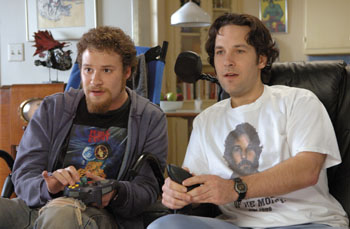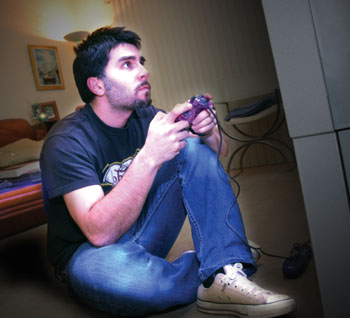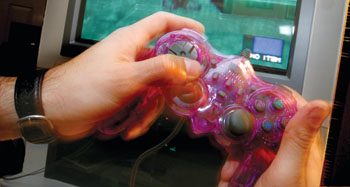![[Metroactive Features]](/features/gifs/feat468.gif)
[ Features Index | Silicon Valley | Metroactive Home | Archives ]

Virgin Territory: Culture finally gets a realistic portrayal in 'The 40 Year-OId Virgin.' Pop Got Game Mainstream culture goes geek-friendly By Clive Thompson HALFWAY THROUGH The 40 Year-Old Virgin is a thoroughly remarkable scene. It's got nothing to do with first-time sex, though. No, it's about gaming: David and Cal, two of the virgin's twentysomething slacker friends, are sitting in his apartment playing Mortal Kombat: Deception. What's so unusual about that? It's that their behavior is so oddly realistic: They slouch in chairs and stare at the screen with nonchalance and intensity, while a sardonic stream of trash-talk flows between them. "You know how I know that you're gay? You like Coldplay," David snarks. Cal responds by pulling off a classic Mortal Kombat "fatality" move. "I'm ripping your head off right now," he says coolly. "It's off. And now—I'm throwing it at your body." The vaguely self-parodying homophobia. The Zen-like calm of the violence. The casual profanity. You have to give director Judd Apatow props: He shot a pitch-perfect evocation of how gamers actually behave when they're playing. It's enough to make you wonder—has Hollywood finally figured out how to realistically depict gaming culture? For years, they've been achingly bad at it. Gamers have long been accustomed to seeing incredibly weird, off-key portrayals in TV and movies. The trouble began with the first wave of TV ads for video games. They'd inevitably portray the player as a spastic in midseizure, flailing away on a joystick while jumping and twitching. Things went downhill quickly. In Tron—a movie that was otherwise somewhat savvy about computers—Jeff Bridges plays an arcade hotshot who is apparently so desirable to the ladies that they literally form an enormous wedge behind him as he plays, cooing in admiration. (That certainly didn't match any known reality I'd observed in my 1980s teenagehood.) A few years later came The Wizard, in which the villain used a Nintendo "Power Glove"—one of the most laughably useless controllers ever. How many people actually bought those things in real life? Like, 17? Soon, TV shows began showing gamers onscreen, with equally bizarre results. Every time a PlayStation or arcade showed up on a sitcom like Friends, or even a technologically hip show like The X-Files, the players were portrayed as glassy-eyed automatons, rendered mute—and possibly sociopathic—by the cold grip of the machine.
I'm ready for my close-up: With billions of dollars in revenue annually, Hollywood has become interested in video games and the people who play them. The Twitching Means It's Working Obviously, part of the problem was generational. Back then, most directors were too old to play games, and clearly didn't bother to observe anyone who did. But to be fair to Hollywood, game culture is also hard to film because so much of a game's appeal is internal. All the strategizing, the mental mapping, the cybernetic thrill of being in a loop with a complex system: that's all invisible. It happens inside your head. As TV critic Neil Postman noted, "The act of thinking is not televisable." Games suffer from precisely the same problem. That's why directors resort to such exaggerated physical cues—the bugged-out eyes, the twitching—in an attempt to paint the excitement of game-playing on the outside of a player's body. But I think the tide has finally turned. These days, half the movies I see have engaging, witty depictions of everyday gamers, none of whom are latent homicidal maniacs. Entourage, the hit show about a young movie star and his childhood friends, regularly includes shots of the characters bantering lazily as they play Xbox sports games. Shaun of the Dead had a hilarious segment in which a lead character deployed a classic social hack I've used in real life: He ignored someone talking to him by pretending to be catatonically absorbed in a first-person shooter. Games have clearly jumped that generational divide. Today's young directors are the first crew to have grown up with a Nintendo system—and gaming is no longer foreign to them. This could have intriguing implications for the age-old violence-in-games debate. After all, one of the reasons many people—particularly middle-aged politicians—worry about games triggering aggression is they don't actually know any real-life gamers. All they have are the caricatures they've seen on TV and in movies, or even worse, in scare-tactic TV news segments. If that was all I knew of gaming culture, I'd probably be terrified of teenagers too.
Control Issues: Part of the reason it's been hard to portray gamers realistically is that so much of the video game experience is internal. But now people will go to the big screen and see the new face of gaming in which players are goofy, smart and fundamentally harmless. And they may even witness the wonderfully cool sense of control, the "mind like water" stillness, that a really good gamer achieves. That is, unless we just sort of suck at the game we're playing. One of the funniest parts of the 40 Year-Old Virgin scene is that Cal appears to be button-mashing—and if you look closely, you realize the actor appears to be doing it intentionally. He and Apatow know gaming culture well enough that they can not only produce a scene of realistic gaming, but of realistically lame gaming. Now that's artistry. But here's one caveat. Gamers with keen eyes will notice that Cal is using a Nintendo 64 controller—even though Mortal Kombat: Deception was not released for that platform. Apatow's good—but even he's not perfect.
Send a letter to the editor about this story to letters@metronews.com. [ Silicon Valley | Metroactive Home | Archives ]
|
From the January 25-31, 2006 issue of Metro, Silicon Valley's Weekly Newspaper.
Copyright © 2006 Metro Publishing Inc. Metroactive is affiliated with the Boulevards Network.
For more information about the San Jose/Silicon Valley area, visit sanjose.com.

